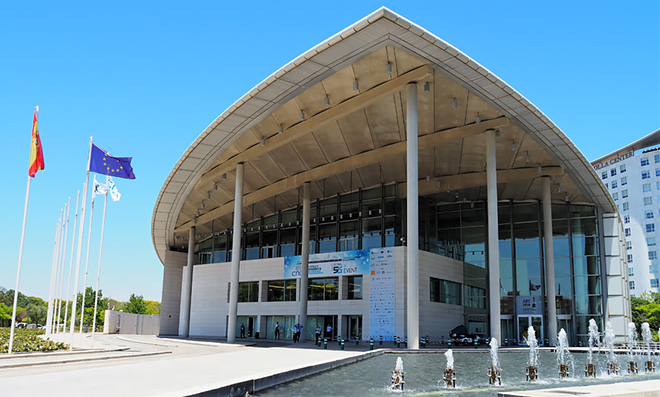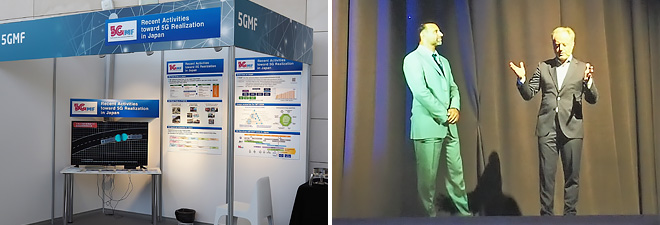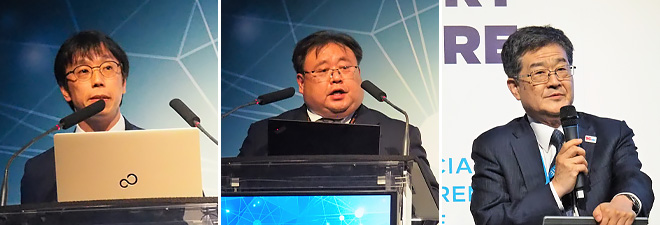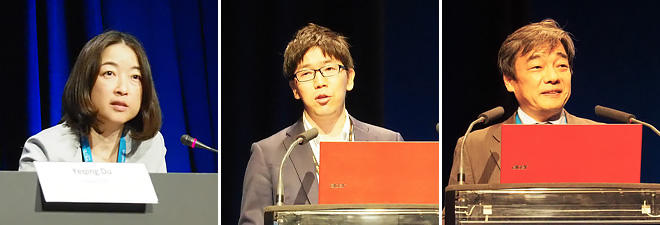Report on the 7th 5G Global Event and the EuCNC 2019
The 7th Global 5G Event, organized by the 5G Infrastructure Association (5G-IA), was held in conjunction with the annual European Conference on Networks and Communications, otherwise known as EuCNC 2019, from Monday June 17, 2019 until Friday June 21, 2019 at the Valencia Conference Center in Valencia, Spain.
5G promotion organizations from Japan, Europe, the United States, South Korea, and Brazil rotate hosting this annual event. The title of this year’s Event was “Creating the Smart Digital Future”, while the title for EuCNC 2019 was “Enabling Smart Connectivity”.
Featured at the Event were presentations on the specific services being offered in South Korea and the United States, where 5G is already being offered on the market as well as activities happening globally around the increasingly diverse range of use cases in which 5G will be utilized. Active discussions around the early concepts of Beyond 5G and 6G also made an impression on those in attendance.
In addition, there was also a 5GMF display booth at the conference center, which provided information on posters as well as video displays on the state of 5G deployment in Japan as well as on the 5G field trials. A booklet describing the results of the previous year’s 5G field trials was also distributed and European participants, where progress is being made on the 5G Trial Project, showed a high degree of interest in these results.
■ Key Points
The Event began with opening remarks by Dr. Colin Willcock, 5G-IA Chairman of the Board, followed by greetings from several others, including Mr. Antonio Fernandez-Paniagua, representing the Directorate General of Telecommunications and Information Technology of the Ministry of Economy of Spain.
During the opening session the 5G-IA’s Dr. Willcock moderated a discussion on spectrum harmonization and government policies related to 5G, with presentations from representatives of the European Commission as well as representatives from four national governments.
Mr. Nakazato Gaku, from the Ministry of Internal Affairs and Communications (MIC) and representing Japan during this session, gave a presentation entitled 5G Progress and Challenges in Japan, in which he discussed the state of 5G deployment in Japan, the MIC’s 5G Field Trials, and local and private 5G. In addition, he discussed the potential that 5G had to change people’s day to day lives as well as the economy and society as a whole.
This session was followed by the keynote speech by Mr. Tomás Alonso of the Spanish mobile operator Orange. Mr. Alonso’s speech, entitled, Orange Spain on the Road to 5G, introduced his company’s 5G-related activities. During the speech, a holographic projection of a person suddenly appeared and began to have a conversation with Mr. Alonso. Conference attendees were surprised at this demonstration of 5G technology’s ability to facilitate real-time communication between the conference center and Orange’s headquarters, which were connected by a 5G network.
The theme of Session Two was 5G Regional Trends and it was moderated by Prof. Hyeon Woo Lee of DanKook University. Presentations included information on research and development, field trials as well as the marketization of 5G in different countries around the world. NTT DOCOMO’s Mr. Okumura Yukihiko, from Japan, gave a presentation entitled “5G System Trials in Japan”, during which he gave an overview of the current state of the 5G Field Trials.
This was followed by a question and answer session with the theme of 5G Commercial Success, which was moderated by independent spectrum expert Mr. Ruprecht Niepold. He asked several questions including: what are the conditions for successful marketization in individual countries, what are the key factors for success, and what are the differences in timing in each country? These questions were answered from the national perspective of various countries using indicators from business and social factors. The 5GMF’s Deputy Secretary Mr. Ohmura Yoshinori from Japan indicated that a key factor in the successful adoption of 5G in Japan would be promoting widely the idea that 5G can help solve important issues facing Japan, such as the aging population, the decrease in the working population, and the need for regional revitalization.
The second day began with Session Three, with the title 5G for Business, moderated by the 5G Forum’s Prof. Suncheol Gweon. It included presentations on collaborations with verticals and discussions on trends in services from the perspective of demand. KDDI’s Ms. Kurosawa Yoko of Japan gave a presentation entitled “5G for Business,” in which she discussed KDDI’s activities related to 5G, “open innovation” as well as its field tests on the remote control of construction vehicles.
Session Four was moderated by 5G Americas’ Mr. Chris Pearson. Entitled Looking Forward, this session provided an overview on next generation networks. Pearson asked participants to answer simply yes or no to whether current studies on next generation networks should be called Beyond 5G or 6G, which was answered unanimously in support of the nomenclature of Beyond 5G. KDDI’s Mr. Inohara Ryo from Japan gave a talk entitled Beyond 5G ~Vison & Required Technology, during which he introduced the development of 5G, followed by the necessary requirements for Beyond 5G, especially in the development of further extensions and the formation of new concepts.
At this stage of the conference Ms. Zhiqin Wang, representing China’s IMT-2020, announced that the next Global 5G Event would be held at the Shanghai International Convention Center in June 2020 in conjunction with MWC Shanghai 2020.
In the afternoon Session Five, a joint session with the EuCNC entitled Cross Regional Projects, was held. Moderated by Huawei’s Mr. Yeqing Du, this session provided information on projects from Europe, the United States, China, South Korea, and Brazil.
Session 6 on 5G KPI measurement was moderated by Mr. Maurizio Cecchi of Associazione P.I.I.U. The last presenter was Fujitsu’s Mr. Nakamura Takaharu, who gave a presentation entitled 5G KPIs in Real Terms, in which he gave an overview of measuring key performance issues of 5G in real world environments. This was followed by the closing ceremony of this very successful 7th Global 5G event.
The EuCNC 2019 was held exclusively from Wednesday, the third day of the conference, until Friday, the fifth day of the conference. EuCNC keynote addresses and panel discussions were held on the third day and the morning of the fourth day while during the third day, the afternoon of the fourth day, and the morning of the fifth day, workshops were held that focused on specialized fields.
Keynote speeches were given on the following topics: WI-Five-G”, which was about internet reliably when connecting via Wi-Fi, as well as 5G in Automotive, Completing the 5G Vision and 5G – A Door Opener for 6G. Panel discussions were also held with the titles of Beyond 5G and Future Connectivity and Network Security.
In addition to the speeches and panel discussions, there was an exhibition with 70 information booths, the majority of which focused on European field trials. Participants who visited these the information booths could learn about the development of equipment for a variety of use cases as well as the progress occurring in field trials. The 5GMF booth displayed both posters as well as video displays with information on the status of 5G deployment in Japan as well as the 5G field trials. A booklet detailing the results of the previous year’s 5G field trials was also distributed to major figures who attended the Global 5G Event.




